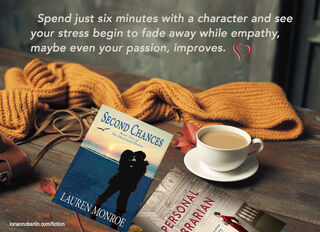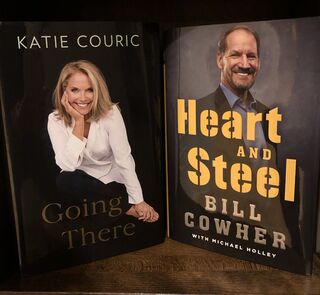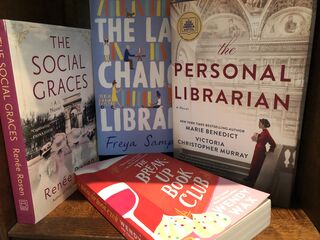Relationships
One Habit Brings Couples Closer
A ritual that can lead to greater empathy, and even intimacy.
Posted November 8, 2021 Reviewed by Kaja Perina
Key points
- Women who read romantic fiction make love 75 percent more often than non-reading peers.
- Eighteen percent of men read romances and download one-third of erotic audiobooks.
- Romance in any story fosters relationship-centric conversations that might not otherwise occur without this pasttime.
- Reading fiction, even memoir, adds to our understanding of social experiences, therefore enhancing our emotional intelligence.
The nights are longer and darker. The chill brings us indoors. With New Year's approaching, we all want to cozy up with a special someone. Here's a tip: Choose a mate who likes to read.1 There are long-lasting health benefits when we lose ourselves in a book.

First, losing yourself for as little as six minutes in a character’s world reduces stress by 68 percent, according to University of Sussex researchers.2 What’s more, if you peruse text more than three and a half hours every week, you’re 23 percent more likely to live longer.3
Book sales have soared, providing mental escape; reading certain novels brought couples together figuratively, and then quite literally.4
A blogger, self-identified as a book snob who judged romantic fiction poorly, said, “Boy was I wrong, one good chapter can give my sex drive the boost it needs.”5
Third, reading emphasizes emotion and knowledge. It enhances empathy and imagination, in and out of bed. People don’t as easily reject new ideas because they see the world from characters’ frames of reference. They’re less selfish and more open to you, their real-life protagonist. These emotions are the foundation of good sex, believe it or not, for most women.

Pre-pandemic figures put romances at 23 percent of overall novel sales, and this may not include women’s fiction, historical, or genres with emotionally driven love stories.6 Women who read love stories make love nearly 75 percent more often than those who don’t read.7
When women relax their minds around loving emotion, heart rate, muscle tension, and hormones are influenced, tipping the scales toward a more erotic mindset.
This year, Esquire featured “Better for You Than Porn: Why Men Are Reading Romance Novels.” Men account for 18 percent of romantic books purchased and download one-third of erotic audiobooks. These aren’t necessarily the bodice-rippers of the 1980s, but progressive, contemporary, and inclusive stories.8
“I’m here to tell you that romance novels are for guys—in fact, they’re for anyone who wants to live a more emotionally rich life,” wrote Adrienne Westenfeld. Today’s books foster relationship-centered conversations about pleasure, consent, and how to be a good partner. They model emotional availability and vulnerability in a world that’s touted suppression.
What about men being visual? Reading offers obviously a different experience than porn, which is void of emotion and puts true intimacy at risk. “Porn users are in danger of becoming attached to a mere fetish of impersonal sex,” writes John Gottman in What Makes Love Last, where he explains how porn rewires the brain and sabotages relationships.9
Publishers know these readers are savvy, educated, empathic. And not shy to communicate desires, which often equate to escape.
In The Wall Street Journal (11-11-2016), Susan Pinker wrote: “Mounting evidence suggests the mental calisthenics required to live inside a fictional character’s skin foster empathy for the people you meet day-to-day.” Reading aids human interactions.10
“The most important characteristic of being human is that our lives are social. Fiction can augment and help us understand our social experience,” says Keith Oatley, professor emeritus of cognitive psychology at the University of Toronto. Given fiction’s ambiguous nature, readers accept uncertainty, entertain possibilities, and are thought to be creative and more connected.11
A person’s somatosensory cortex, which allows response to sensory input, strengthens when we read.12 Perusing dialogue, interpreting character gestures forces us to stop, contemplate and connect with our real-life counterparts. This connotes higher emotional intelligence (as is needed for intimacy) and positive health benefits.13
While fiction is fun, never underestimate a memoir, very much about human connection and often real love stories.
In No Time Like the Future, Michael J. Fox reflects upon his Parkinson’s, at the pinnacle of his career, and how he moved forward with his wife's help.

In Going There, Katie Couric gets candid about an eating disorder, sexism, caregiving, and how her workplace contributed to the Me-Too movement. Heart and Steel isn’t only about football. You’ll learn loyalty, work-life balance, and determination. Like Couric, Bill Cowher knew the sorrow of a cancer-stricken spouse. He shares that, plus his 24-hour rule after a game loss. Both books capture saying goodbye to a loved one and newfound love with much discernment.
Recent novels with loving themes are plentiful. Wendy Wax lost her husband to COVID during lockdown as she worked on The Breakup Book Club, four unexpected female journeys, including the men in their lives.
Career ambition clashes with 20th-century reality as Belle da Costa Greene, born African American, passed as white, even to her lover. Without keeping her secret, she may never have become The Personal Librarian of J.P. Morgan.

More historical fiction shows the infamous protagonist in the past century's most talked about love story in a positive light if you read The Duchess: A Novel of Wallis Simpson.
Josh Cohen blends psychoanalysis and literature in How to Live, What to Do: In Search of Ourselves in Life and Literature. The back cover says: “Successful fiction, like successful therapy, sets a mirror before us, in which we see not only the self we know but the self we don’t.”
What prism of characters or real-life accounts, will tug on your heartstrings after you select your next book?
Copyright @ 2021 by Loriann Oberlin, MS
Related Blogs: One Stress Reducer to Put to Use and Mindful Distractions
References
1. https://www.bbgblog.com/readers-of-romance-novels-have-better-sex-lives/ and https://www.elitedaily.com/life/culture/date-reader-readers-best-people-fall-love-scientifically-proven/662017
6. https://www.washingtonpost.com/news/soloish/wp/2018/02/12/why-dont-romance-novels-get-the-respect-they-deserve/ and https://fortune.com/2021/08/21/rom-com-pandemic-book-sales-romance-bookstore-day/
7. https://www.upi.com/Archives/1985/10/28/Romance-readers-like-sex/7706499323600/ and https://www.bbgblog.com/readers-of-romance-novels-have-better-sex-lives/




